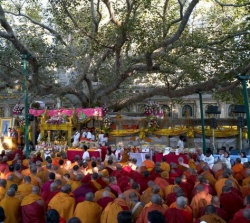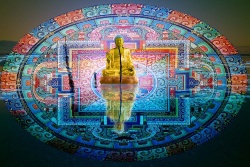Difference between revisions of "Modern Buddhism: sacred or profane?"
| Line 1: | Line 1: | ||
| − | {{DisplayImages|4}}<nomobile>{{DisplayImages|3301|4483|229 | + | {{DisplayImages|4}}<nomobile>{{DisplayImages|3301|4483|229}}</nomobile> |
Latest revision as of 22:55, 5 August 2017
Editorial Comment by Zenmar
At my local health food store next to the cash register is a chrome plated magazine rack neatly stocked with yoga magazines, an assortment of gourmet magazines, one oriental magazine about qi energy, and two Buddhist magazines, Shambhala Sun and Tricycle. The last magazine looks more like a clone of Vanity Fair than a serious ‘Buddhist review’ which it bills itself.
While I used to buy both Shambhala Sun and Tricycle, these days I usually resist the temptation given their cost. Another reason why I don’t buy these magazine anymore is that the content of these magazines really doesn’t fit with the heart of Buddhism’s sacred context which I think is mysticism.
While I really don’t expect any of the writers who contribute to these Buddhist magazines to be budding religious geniuses like Gautama the Buddha or Bodhidharma who brought the secret of Zen with him to China, I do expect a Buddhist magazine to be more concerned with a small slice of the sacred world than with the everyday world of the profane. Even as a form of escapism, I prefer these magazines dwell on mystical themes and intriguing stories about great teachers than, for example, dwell on psychological issues.
Seeing Buddhism being presented this way I can see it is not going to last long in our culture.
Trying to clean the dust off of my general concern, I see an alarming trend in modern Buddhism that finds itself stuck between the sacred and the profane world, leaning more and more heavily in the direction of the profane with each new publication that comes to the stands or to the shelves of modern bookstores in shopping malls. Offhand, if I were to guess just one reason as to why the trend is going this way, I could say, “Blame it on microeconomics.” By that I mean, every financial enterprise, including a Buddhist publisher, has the right to make money, hopefully creating a demand for his product; trying to sell the profane mind on Buddhism because that is where the money is. I guess there are other reasons too, as to why Buddhist magazines, in particular, wish to appeal to the profane mind.
But then is the product which Shambhala Sun and Tricycle are trying to sell, for which there is a demand, profane? And should they being doing it? Taking a quick sample of popular Buddhist literature, including slick magazines like Shambhala Sun or Tricycle from what I can surmise, the profane product they’re all trying hard to sell is how to feel good or the same, how do I restore and keep myself in a state of feeling good about myself? If we equate this need with hedonism, which most modern philosophers agree is the driving force of our economic system, then our case succeeds. Indeed, hedonism and the profane are from the same lineage. One term is the general expression for a life given to self-pleasure while the other term denotes an absence of a true spiritual attitude.
If we require more concrete evidence, not being yet satisfied with a loose confirmation, we need a criterion to detect profane concerns. The source of our word “profane” is derived from the Latin word profanus which literally means, to be outside of the temple as to not be sacred, consecrated, or initiated (into the mysteries). This chimes nicely with the Buddhist term “puthujjana” often translated as “common folk” as opposed to “ariyan”, meaning “noble” referring to those who have entered the stream of sacred initiation leading to emancipation from suffering.
With our criterion now in front of us, we can tentatively conclude that most people who buy such magazines about Buddhism are outside of Buddhism’s temple of depth and profundity. Speaking on the matter of depth and profundity, here is what the Buddha had to say about what he had discovered after his awakening. His remarks clearly indicate that he found something hard to understand for the run-of-the-mill person.
The Dharma obtained by me is profound, of deep splendor, difficult to see, difficult to understand, incomprehensible, having the incomprehensible as its scope, fine, subtle, the sense of which can only be understood by the wise (Catusparisat Sûtra).
Taking his words for granted, can any modern Buddhist really believe that they are privy to the Buddha’s profound principle whereby he saw the element of immortality (P., amatadhâtu)? I don’t think so. The profane person simply hasn’t worked up a sweat trying to figure it out for himself. Likewise, it also follows that most popular Buddhist literature, including magazines, won’t be terribly interested in plumbing the profound depths of the Buddha’s Dharma, if they are supplying the demands of their profane subscribers.
For example, I am not aware of Tricycle exploring such mystical Buddhist works as the Avatamsaka Sutra or the Lankavatara Sutra. It is far easier to present a superficial and, often, revised understanding of Buddhism to the profane, everyday mind. Besides that, it makes money. Not a lot of money, but just enough to get buy and influence the Buddhist world.
The case gets even stronger when we define the word “sacred”. A brief definition, the word “sacred” means “that which has been rendered holy.” Going a bit further, the word “holy” is virtually synonymous with the the idea of wholeness, health, and safety. Distilling this, the scared is what gives us the sense or feeling of being saved from the afflictions of this world, a world which is impermanent, suffering, and insubstantial. By comparison, the profane life is what we do to survive. However, we never really know if what we are doing is making us sacred. Certainly, just trying to feel good is not automatically sacred. Nor is trying to restore a good feeling about myself a guarantee of sacredness.
Those who have encountered the sacred—even just a few sacred moments—prize this experience over and above the delights of the profane. Poets, writers, musicians who have felt the presence of the sacred in their lives can well attest to its overwhelming power which confirms that one can be saved from their suffering. Holding this idea in our mind and the definition of the profane, can anybody seriously call Buddhism’s popular literature, with its slick magazines, sacred? So why might Buddhist publishers desecrate their literary products with uninspiring themes and articles about depression, alcoholism, or anger? To be honest, I can’t give a good reason. Nevertheless, profaning Buddhism continues, taking away its sacred presence. In its stead, we are left an appalling display of Buddhism being dumbed down for mass consumption. Finally, we need to ask, is it right for publishers to do this? I think the answer is only if the profane content they publish leads to its own critique and shows, instead, the better path of the sacred.
Source
http://www.darkzen.org/Articles/Modern%20Buddhism_sacred_or_profane.htm



